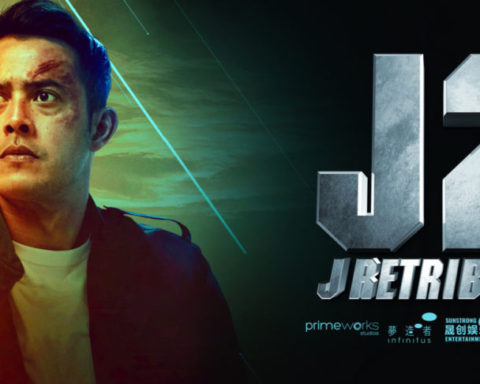If you’ve already seen The Call, scroll to the bottom of this review for a discussion on the ending.
Remember the movie Frequency with Dennis Quaid and Jim Caviezel? It was one of those high-concept, turn of the century joints in which a man in 1999 is able to talk to his dead father in 1969. They end up communicating across time and space by way of a ham radio and some really dodgy pseudo-science involving the aurora borealis. There are the usual time travel shenanigans. There is a cool double showdown with a notorious killer. And very little consideration for quantum theory. But none of that really matters. What’s important is that both men form a relationship, they solve a crime, and end up saving each other’s lives.
Frequency wasn’t a movie about physics, and neither is The Call, which borrows heavily from it, in both its concept and in certain elements of its execution. These movies don’t want you to worry about the nitty gritty of their premise. Whether it’s the supernatural, or the divine, or just “quantum baby,” the important thing is that you’re emotionally invested in what happens to these characters.
In Frequency, it was rooted in the sentiment of being able to hear the voice of a loved one who you thought was lost forever. In The Call, it is rooted in the powerlessness of having absolutely no control over your present and future.

The Call is the story of two women who occupy the same space across two different times. The home where they grew up is at the core of this thriller where Seo-yeon (Park Shin-hye) and Young-sook (Jeon Jong-seo) are victims of familial circumstances that are seemingly beyond their control. The women find each other by way of a black cordless phone which, for reasons that are never explained, allow them to communicate across the two decades that separate them. What begins as the story of two women finding solace in one another quickly turns into something a lot more sinister.
Frequency was the first movie to toy with this concept of “phone calls across time,” but there have been many remakes and spin-offs since. That movie was remade into a short-lived TV series in 2016, which also served as the inspiration for similar Korean (Signal) and Japanese (also Signal) procedurals. The Call, however, takes its horror cues from the 2011 movie The Caller.
None of this is timey-wimey stuff is mulled over for very long and the both of them quickly accept the weird situation that they’re in. (They’ve probably seen Frequency and it’s many derivatives.) Director Lee Chung-hyun doesn’t bother with the faux drama of having his leads be dazed and confused over the concept of his movie. Instead, he uses that time to create rapport and set up the rules of engagement.

One of the reasons The Call works so well is because it plays well within these established rules. Time travel is a tricky thing, and trying to weave together a coherent story in which the past, present, and future commingle is practically impossible to do without narrative consequences. Which is why the best time travel movies set up their own rules and then create dramatic tension by working within those confines. They often bend those roles to create unexpected twists, but they don’t ever break them.
As audiences, we seem drawn to movies that feature this sort of loophole in reality. There is an appeal to the unexplained that draws us in. And even though we may not get any answers to the whys and wherefores, we’re happy enough to bask in the mystery for a while. More so when it’s pulled off this well.
The Call, much like Frequency before it, keeps you engaged by evoking an emotional response. The movie does well to get you invested in the lives of these women by creating an affinity to their plight and the bond that they share. There are still some holes and inconsistencies here and there, but I was so anxious for Seo-yeon and Young-sook that I wasn’t trying to dissect the mechanics or unravel the plot.

Director Lee Chung-hyun uses every tool at his disposal to create the foreboding atmosphere that the movie resides in. From the music, to the lighting, to the way he transforms the interior and exterior of the house as events shift and slide around these two lives. There is darkness lurking around every corner, but he is smart to lull you into a false sense of security by undercutting that tension with occasional moments of sweetness and sentimentality.

The Call also dabbles in those perennial questions of time travel but, unlike other genre pieces, doesn’t get confounded by them.What would you give up to change your past? What price would you pay to know what happens to you in the future? Here, the answers to those questions are secondary. Here, the motivations of these women are simple, and ultimately selfish, but completely relatable.
Park Shin-hye and Jeon Jong-seo make for incredibly watchable leads. They swing between heartbreaking and horrifying. They carry this movie with their manic energy, with each one willing to do whatever it takes to save themselves from the other.

For a remake of a remake, The Call doesn’t at all feel derivative. With it’s tight storytelling and fantastic performances, this movie doesn’t just stand on its own two feet, it manages to also stand apart from everything that has come before.
But even more than that, the real triumph here is that The Call still manages to surprise. Not with its shocking twists and turns (of which there are many), but rather in the way it uses its premise to create a compelling character piece. It makes the case for how even the best intentions can lead to chaos. Because the scariest monsters aren’t the ones hiding in our closets or under our beds. The scariest monsters are the ones inside of us. They are the grudges we hold onto. They are the warped memories of our past. They are our darkest intentions just waiting to be set free.
The Call
Netflix
112 minutes
Director: Lee Chung-hyun
Writer: Lee Chung-hyun
Cast: Park Shin-hye, Jeon Jong-seo, Kim Sung-ryung, Lee El, Oh Jung-se, Lee Dong-hwi, and Park Ho-san
Check out our interview with The Call director, Lee Chung-hyun, where he gives us a definitive answer on whether or not there’s going to be a sequel.
The Call is now streaming on Netflix.
Now… About That Ending…
Spoilers Ahead. Obviously.

The Call Ending Explained
Once again. There be spoilers ahead. You have been warned.
Is This the End?
During the climax of the movie, we saw Seo-yeon’s (Park Shin-hye) mother, Eun-ae (Kim Sung-ryung), sacrifice herself to take down Young-sook (Jeon Jong-seo) and save her daughter. Eun-ae charges into Young-sook just as she’s about to kill the younger Seo-yeon, both women go over the bannister on the first floor landing, fall from a great height, and are left for dead.
In the epilogue of the movie, however, Seo-yeon, who is at the cemetery mourning her loss, is miraculously reunited with her mother who seems to have somehow survived her showdown with Young-sook. Seo-yeon is happy and relieved and the both of them walk away, hand-in-hand, and live happily ever after.

Or do they?

Lest we forget, this is a Korean movie, and they are loathe to give us a happy ending.
What’s Going on in Those Post-Credits Scenes?
During the credits we are shown a series of scenes which suggest that Young-sook too did not die in the fall.

First, we flashback to an earlier scene in the movie – at about the 1 hour 28 minute mark – where we see Young-sook talking to someone while silhouetted behind a glass wall. We are finally made privy to the full conversation she was having on the phone.
We learn that 2019 Young-sook warns 1999 Young-sook that Eun-ae and a policeman would be at her door soon, and to be wary as she might get killed. She tells her to hold on to the phone regardless of what happens. Even if things go badly.
We then see the aftermath of the climactic fight, where a broken Young-sook, alone and lying in a pool of her own blood, opens her eyes and looks at the camera.
After this, we cut back to the cemetery, to Seo-yeon, only to see her mother flicker and disappear.

Finally, we see a grown up Seo-yeon tied to a chair and held captive in Young-sook’s basement.

What Does It All Mean? The Ending Explained!
Here’s what we know about the rules of this world, as set up by director Lee Chung-hyun.
1) Even though Seo-yeon’s present is changing based on what’s happening in the past, it seems like only major life or death events seem to have an impact on it. This would explain why Seo-yeon’s present only changed whenever someone was killed, or was saved from dying. It also explains why her present didn’t change when her younger self was being held captive by Young-sook.
2) Both Seo-yeon and Young-sook seem to be in some kind of bubble. Even though the world around them changes, the both of them seem to retain memories of everything that’s happened before. This must be due to some supernatural power afforded to them by the 1990s black cordless phone.
3) Their timelines are connected. If it’s 3PM in 1999, then it means that it’s 3PM in 2019. And if a major life or death event occurs at 3PM in 1999, then the change would happen at the same time in 2019. This is made clear during the scene when Seo-yeon tries to kill Young-sook by tricking her into going to the site of the greenhouse where a gas explosion takes place at 5PM. The detonation occurs, we hear Seo-yeon’s phone alarm go off at 5PM, but her world doesn’t change, which immediately tells us that Young-sook survived the blast.

Got all of that? Good.
In the version of 2019 that we see at the end of The Call, where Young-sook doesn’t get arrested by the police and lives out her life as a serial killer, it would make sense that she continues to be in communication with her past self. What this post-credits sequence tells us is that Young-sook was already aware that Seo-yeon’s mother and the policeman were going to be at her door. She knew there was going to be some sort of showdown. And despite not knowing the outcome, she made sure to hold on to the phone.
When Seo-yeon meets her mother at the cemetery at the end of the film, it implies that her mother survived and was okay for the few minutes or so before Young-sook awakened. So what we are seeing at the cemetery when Seo-yeon and her mother are reunited actually takes place in the short time period between Eun-ae and Young-sook coming to after their fall in 1999.
This second ending implies that when 1999 Young-sook comes to, she proceeds to kill Eun-ae, and keep Seo-yeon a hostage in her basement. The final gut punch being the idea being that Seo-yeon has been trapped as her hostage for 20 years!

As for what happens next? Maybe all of this is just setup for a sequel?


























Follow Us